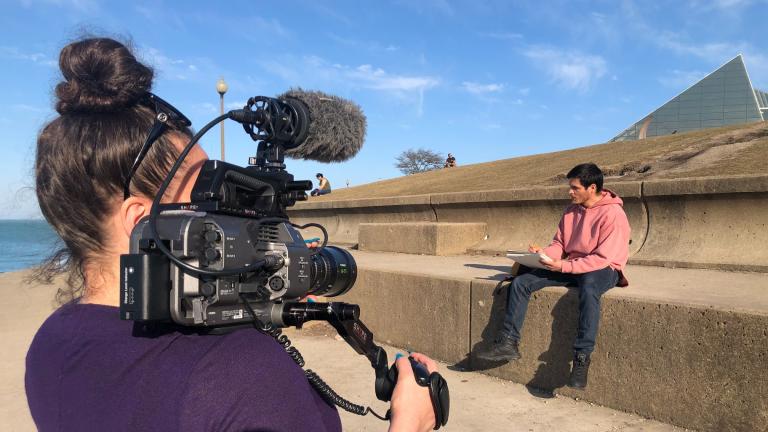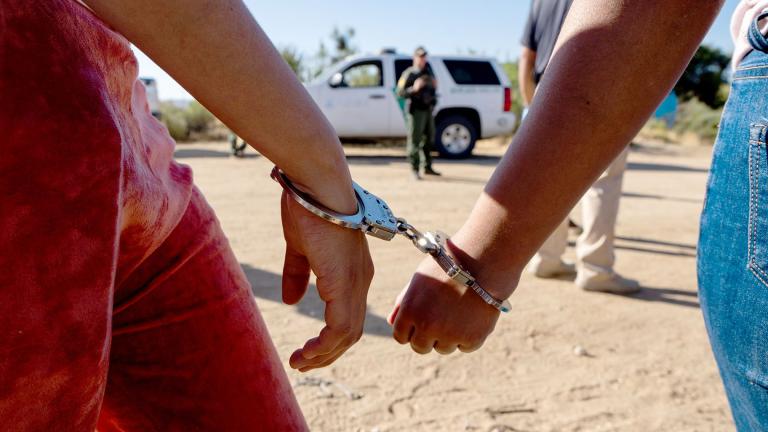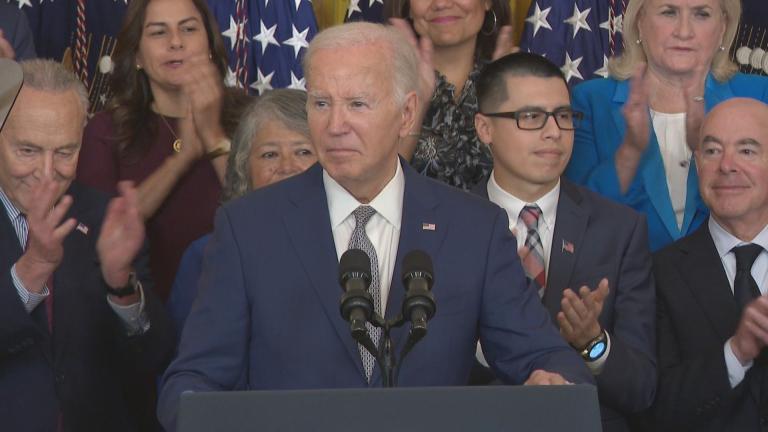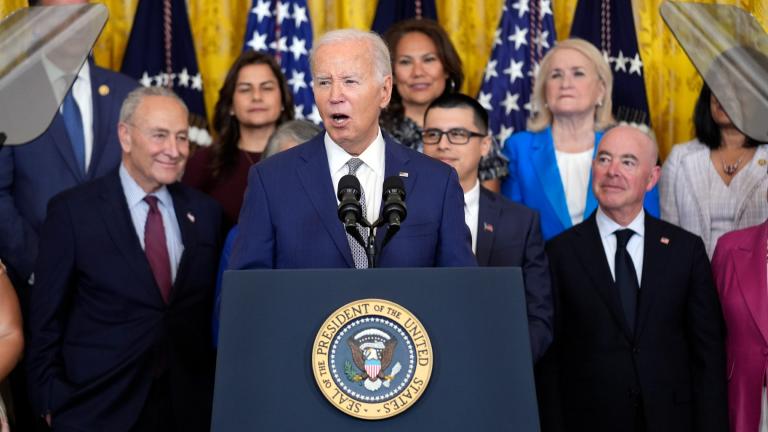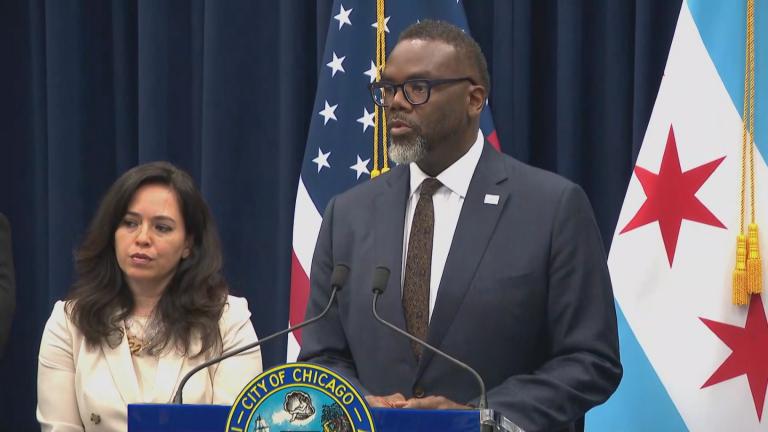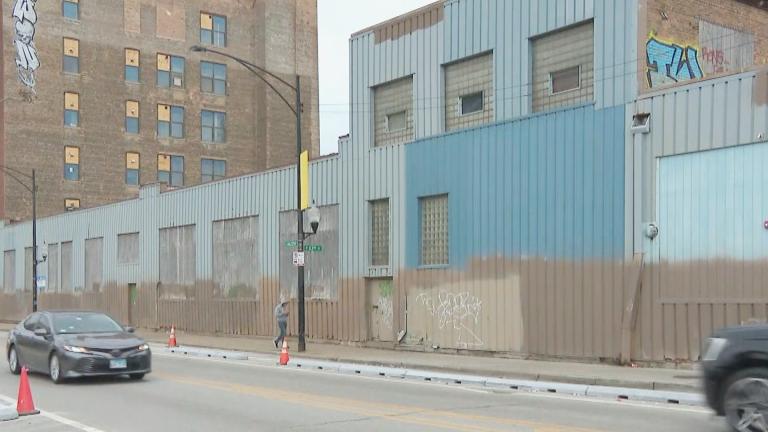Mayor Brandon Johnson will ask the Chicago City Council to spend an additional $70 million to house, feed and care for the men, women and children sent to Chicago from the southern border.
The City Council’s Budget Committee is set to consider the request at a meeting set for 2 p.m. Monday, six weeks after Johnson pointedly declined to join Illinois Gov. J.B. Pritzker and Cook County Board President Toni Preckwinkle when they announced an agreement to set aside an additional $250 million to care for the migrants through the end of the year.
A “joint planning effort” by state, city and county officials released in February pegged the current cost of caring for the migrants at an additional $321 million through the end of 2024, according to a joint statement from Pritzker and Preckwinkle.
If Johnson’s request is approved by the Budget Committee, a final vote by the City Council could come as soon as Wednesday. The funds are set to come from the city’s 2022 budget surplus, Ald. Andre Vasquez (40th Ward) said.
But the approval of the City Council is far from certain.
Alderpeople have had a range of reactions to the request and many questions, said Vasquez, the chair of the Immigrant and Refugee Rights Committee, who said he was urging his colleagues to support the plan.
“I hope people understand what’s at stake, and what it would mean if the shelters had to close,” Vasquez said, warning that the city could face a surge of homelessness and public safety challenges.
Shortly after taking office, Johnson pushed through a proposal first made by former Mayor Lori Lightfoot to spend $51 million to care for the migrants. The 34-13 vote to approve that plan came after tension between Black and Latino Chicagoans boiled over, resulting in an intense debate that featured racist abuse.
The city’s 2024 budget, approved in November, set aside $150 million to care for the migrants, even though that was a little more than half of what the city spent to care for Chicago’s newest arrivals in 2023.
Johnson asked the City Council to earmark less than the full projected cost to care for the migrants to acknowledge that the burden should not fall entirely on Chicago taxpayers, Cristina Pacione Zayas, who is now Johnson’s chief of staff, told reporters in October.
In all, Chicago taxpayers spent $87.4 million between August 2022 and Wednesday to care for the approximately 39,000 migrants. Another $223 million in grant funds from the state and federal governments were used to care for the migrants, according to city records.
All of the migrants are in the country legally after requesting asylum and most were sent to Chicago by Texas Gov. Greg Abbott, a Republican, as part of an effort to damage President Joe Biden’s chances for reelection and divide Democratic voters.
In briefings with City Council members this week, Johnson urged the City Council to approve the additional funds to prevent chaos in the weeks leading up to the Democratic National Convention. City officials have been warning for more than a year that the convention — and its white-hot spotlight — will trigger a new surge of migrants to Chicago alongside the seasonal increase of people crossing the southern border to request asylum.
The decision by Pritzker and Preckwinkle to jointly announce new funds to care for migrants without Johnson revealed a deep breach between the mayor and the governor over the migrant crisis and an indication of significant tension between Johnson and Preckwinkle, who have been close political allies.
Johnson repeatedly declined to answer questions about whether he reneged on that commitment — or even if he promised to take it to the City Council — at a contentious news conference after the Feb. 15 City Council meeting.
During that news conference, Johnson repeatedly reminded reporters that Pritzker pledged to use $65 million to open a 200-bed shelter in a vacant CVS drugstore in Little Village and to house another 2,000 migrants in a massive, winterized base camp. Plans to build that structure in Brighton Park were scuttled by state officials, citing environmental concerns.
Johnson’s decision to ask the City Council to amend the city’s 2024 budget is an acknowledgment that city officials’ repeated and impassioned pleas for help from the federal government in addressing the humanitarian crisis engulfing the city had fallen on deaf ears, sources told WTTW News.
State lawmakers are weighing Pritzker’s request to include $182 million in the state’s budget for migrant care for the 2025 fiscal year, which starts July 1.
Through mid-November, the state had already spent $478 million to care for the migrants, state officials said.
Pritzker at an unrelated news conference Tuesday praised Johnson’s efforts to care for the migrants.
“The city’s been working very hard at addressing the crisis of incoming buses that are being sent here from Texas,” Pritzker said. “We have been working together, the city, the county, the state — gosh, since August 2022 — to make sure we are providing everything that’s necessary for people just to get a handle.”
The number of migrants arriving in Chicago has risen 5.6% in the past month, according to city officials.
Fewer than 9,400 people were living in 20 city facilities as of Thursday, an 18% drop since March 11, according to city data.
A new shelter is set to open in the coming days in the shuttered St. Bartholomew Church in Portage Park, as part of a joint operation by city and county officials. That shelter, to be run by the Zakat Foundation, will house as many as 350 men, women and children in the former convent and school, which are set to be leased to the city free of charge.
Since city officials began enforcing a 60-day limit on shelter stays, more than 100 people have been forced to leave city facilities, according to city data.
City officials are continuing to fight a measles outbreak at the city’s largest shelter for migrants, located in Pilsen. Three cases have been confirmed in the past seven days, a significant drop from the previous week, according to city data.
Contact Heather Cherone: @HeatherCherone | (773) 569-1863 | [email protected]

